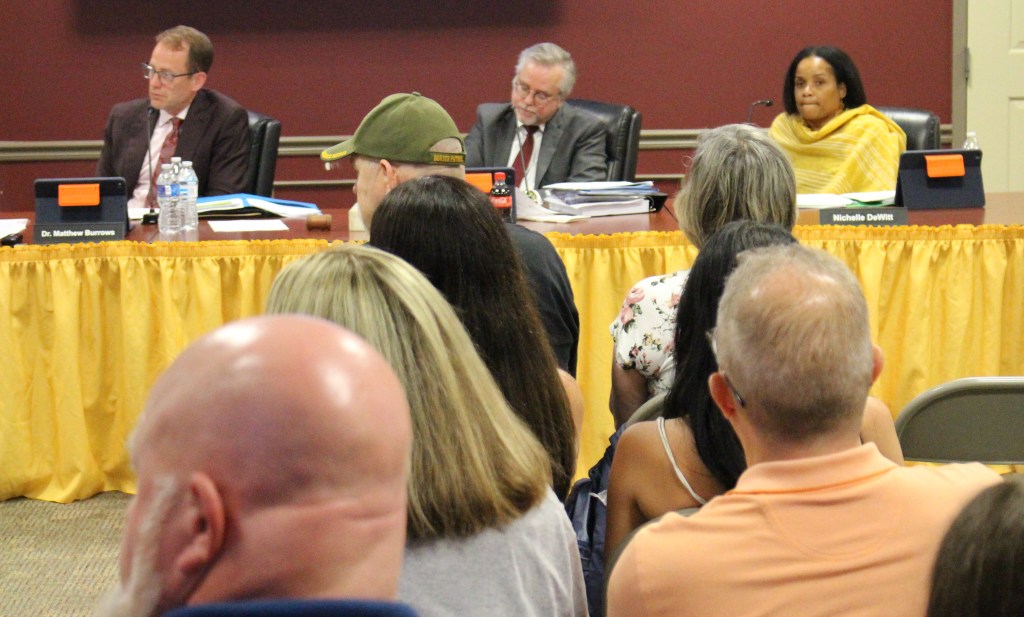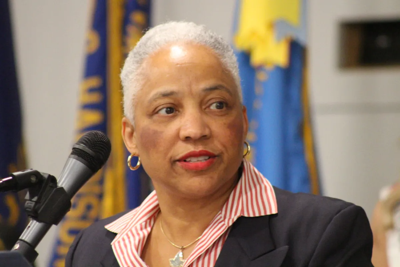The state auditor didn’t find any evidence of theft or fraud in a review of Appoquinimink School District’s finances, but its bookkeeping errors did run longer than initially believed due to oversight failures.
A special inquiry into the Middletown-Odessa-Townsend-area school district culminated in a 14-page report published by State Auditor Lydia York on Wednesday that “reveal failures in budgeting, reporting, and review that have resulted in Appoquinimink running large deficits for several years running.”
The most concerning finding was that for the last three years expenditures tracked by the district did not match those submitted to the state’s First State Financials database. Those discrepancies ran in the millions of dollars and went unrecognized due to failures of multiple levels of oversight.
The auditor’s office faults the school board, superintendent and an appointed Financial Advisory Committee for not sufficiently questioning and reviewing the work of former Chief Financial Officer Eric Loftus, who resigned shortly after the errors were identified by the district.
Investigators said Appoquinmink cooperated in turning over records and sitting for interviews to complete the “special inquiry,” which did not meet the threshold of an audit in order to produce something to inform the public more quickly. The school district is also still completing its own internal review. It's unclear whether York’s office interviewed Loftus.
But York also criticized the lack of public transparency by district leaders, who identified the funding issues nearly two months before they publicly admitted them.
“By delaying disclosure, they not only blindsided families with a 10% increase of prior year current expense tax revenue but also damaged public trust. A more transparent, staged communication strategy could have helped residents understand the challenges and prepared them for necessary measures,” she wrote.
Appoquinimink School District Special InquiryDownload
While York did not find any errors in funding tied to the district’s special education programs or its debt service on capital projects, the numbers submitted for monthly expenditures did not match state records nor did its year-end fund balances.
The district actually spent about $1.8 million less than it reported in Fiscal Year 2023 and $525,000 less in FY 2024, but in FY 2025 it spent $9.3 million more than it recorded in its internal projections.
Its year-end balance was $1 million better than believed in FY 2023, but roughly $5.7 million worse in FY 2024 and $4.9 million worse in FY 2025.
The auditor recommends that the state Department of Education consider standardizing financial reporting across all districts and work with IT developers to automate data going to the state database “to reduce reliance on manual entry, which is inefficient and prone to error.”
York told Spotlight Delaware that the issues that plagued Appoquinimink revolved around its projections — something that her office does not audit. While two years of over-projected expenditures helped hide some of the financial pain, a significant under-projection this year helped to expose the leaning tower of errors.
“They were doing a really bang up job of projecting revenue, but they were not as diligent on the expenditure side. And over time, it got out of whack, apparently, ” she said. “The answer is profoundly unsatisfying. People were making mistakes for some time.”
School districts must manage a continuous churn of appropriations from local, state and federal sources over a fiscal year, which can make projections “more problematic” than the public may understand, York noted.
But she also faulted the school board and Superintendent Matt Burrows for not utilizing the district’s Financial Advisory Committee, an independent appointed body of local stakeholders with business and finance experience, to review Loftus’ work. She said her office found no evidence that the group had met in the last three years.
“By delegating duties to administration without strong questioning, the [Appoquinimink Board of Education] and Superintendent allowed errors to accumulate unchecked,” she wrote in her report.
School districts are not legally required to complete an annual year-end audit to square their finances, something that could have helped to expose the issues much earlier.
“I think that there could be a broader conversation around financial reporting so that the information, the work that we’re required to do by law, matches up with what the public wants to know,” York said.
The auditor’s office is legally required to audit state funds going to the school districts every two years, but those reviews don’t include the totality of a school district’s finances and are not presented in a district-specific format.
The Appoquinimink School District has not yet responded to a request for comment on York’s report. The next district school board meeting is scheduled for Tuesday, Sept. 9.
 The Appoquinimink Board of Education approved a 10% operating tax hike to offset unexpected losses due to accounting errors by the district. | SPOTLIGHT DELAWARE PHOTO BY JACOB OWENS
The Appoquinimink Board of Education approved a 10% operating tax hike to offset unexpected losses due to accounting errors by the district. | SPOTLIGHT DELAWARE PHOTO BY JACOB OWENSWhat happened in Appo?
Starting in May, the school board learned that a projected $7.9 million savings balance for the fiscal year that ended June 30 had essentially been a mirage.
Numerous accounting errors, including a failure to notice that May had an extra pay period and that extracurricular pay to teachers and coaches hadn’t been applied, as well as funds for summer school programs having been appropriated to ineligible federal funds, left Appoquinimink facing a significant budget deficit.
In response, Superintendent Burrows undertook $2.5 million in district-wide cuts to try to reduce that potential burden over the final weeks of the school year. That included the reduction of a few dozen open positions, reassignment of district staff to school-based roles, and cuts to both district and individual school budgets.
In the end, Appoquinimink ended the fiscal year with a cash balance of about $3.1 million.
That put the district, one of the state’s largest that serves more than 13,000 students, in a precarious situation though, because state regulations require districts to have at least two payrolls worth of cash on hand at year’s end. For Appoquinimink, it equates to $4.2 million.
Failure to meet that threshold could risk putting the school district into financial receivership of the Delaware Department of Education, where state officials would overtake financial decision-making, including the setting of tax rates.
To make matters worse, the district had already planned a Fiscal Year 2026 budget built on the now-faulty projections. Failing to find a way to bring in roughly $5 million in new funding would force the district to likely cut dozens of additional classroom positions, Burrows told Spotlight Delaware.
All of these factors came to a head July 8 because state statute requires school districts to report their tax rates to counties by the second Thursday in July – in this year’s case, it was July 10 – in order for the counties to prepare tax bills in time.
In the end, the school board begrudgingly voted 4-0, with one member abstaining, to approve a full 10% tax increase on a portion of the school tax rate — less than two weeks after they had first discussed the issue publicly.











(0) comments
Welcome to the discussion.
Log In
Keep it Clean. Please avoid obscene, vulgar, lewd, racist or sexually-oriented language.
PLEASE TURN OFF YOUR CAPS LOCK.
Don't Threaten. Threats of harming another person will not be tolerated.
Be Truthful. Don't knowingly lie about anyone or anything.
Be Nice. No racism, sexism or any sort of -ism that is degrading to another person.
Be Proactive. Use the 'Report' link on each comment to let us know of abusive posts.
Share with Us. We'd love to hear eyewitness accounts, the history behind an article.